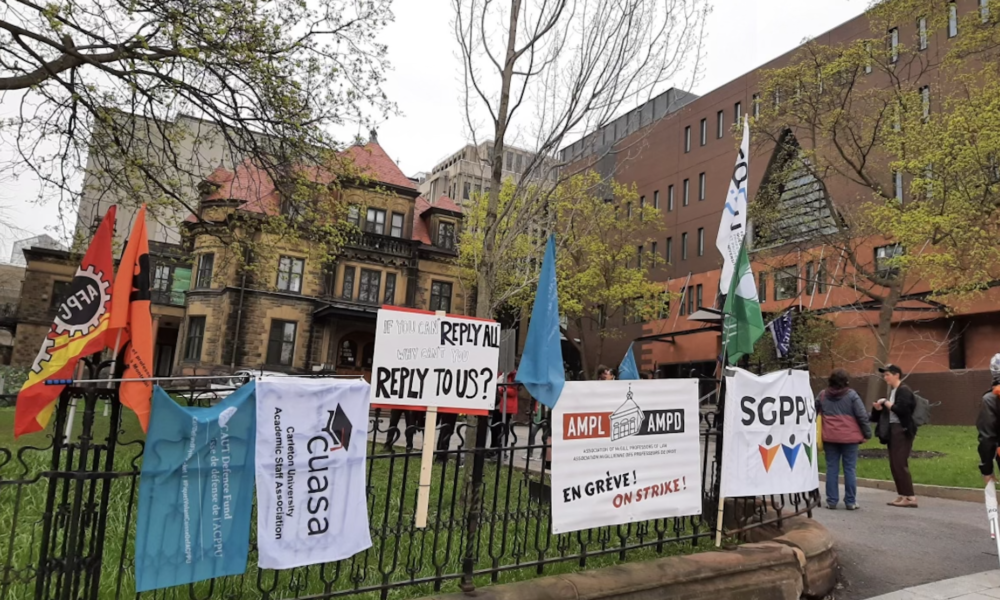The Association of McGill Professors of Law (AMPL) called an indefinite strike on April 24 as negotiations stalled over their collective agreement (CA) with McGill. The CA, which will determine faculty governance as well as the pay and working conditions of law professors at the university, has been under negotiation for nearly a year and a half.
In a letter to students, AMPL noted that they saw a “brief uptick in the pace of negotiation” following the one-day strike they held on Feb. 13. However, they wrote that since then, the university has failed to maintain regular meetings with their bargaining team. In particular, AMPL noted that the university cancelled a bargaining session on April 9, which had been scheduled four months in advance.
Between April 9 and 11, AMPL held a strike vote in which more than 95 per cent of members participated. Over three-quarters of participants voted to pass a mandate for an indefinite strike if the bargaining committee was unable to come to an agreement in principle by April 24. Despite both parties’ efforts to come to a deal at their bargaining meeting on April 23, they were ultimately unsuccessful, prompting AMPL to commence its strike.
AMPL’s proposal for the CA contains 32 articles, 18 of which have been resolved. AMPL noted that of the 18 unresolved articles, several items pertaining to working conditions are nearly settled. However, various monetary proposals, such as salaries and employee benefits, as well as non-monetary proposals, such as administrative and faculty research support, as well as items regarding faculty governance, continue to be under negotiation.
Richard Janda, the chief negotiator for AMPL, told The Tribune that a point of contention in the negotiations is the fact that McGill has refused to accept that it cannot unilaterally change the terms of the contract after it has been signed since this would defeat its purpose.
“You can’t have a collective agreement which says that the employer can change the terms of the collective agreement,” Janda said in an interview. “Frankly, [it] runs contrary to labour law.”
Janda also explained that AMPL deliberately chose to start the strike at the end of April so that classes and exams would be impacted as little as possible. Instead, AMPL would leverage the submission of grades.
McGill Media Relations Officer Frédérique Mazerolle wrote in a statement to The Tribune that the university is working to ensure that law students graduate on time. The Dean and Associate Deans of the Faculty of Law will determine whether students’ work meets program requirements and is of sufficient quality to graduate. However, letter grades will not be assigned until the law professors have returned to work.
Janda noted that “this sets up the prospect of a graduation ceremony without professors present and having to cross a picket line.”
Mazerolle also underlined McGill’s commitment to reaching a collective agreement with AMPL. “Since the beginning of negotiations, in December 2022, our bargaining committee has met with AMPL’s committee 22 times. We have made progress on a range of fronts and wish to continue to work toward an agreement,” Mazerolle wrote.
However, Janda pointed out that these 22 meetings have been scheduled over a period of approximately 500 days and argued that the university may be prolonging negotiations longer than necessary.
“[McGill] perhaps [has] an incentive to drag this out as long as possible because we are the first union of professors at McGill,” Janda said. “I’m sure that the university is not anxious to establish the precedent that if you unionize, you can come to a collective agreement and improve your working conditions.”
Some students have expressed similar concerns over the length of the negotiating process. In a leaked email to McGill’s administration, one law student, who wished to remain anonymous, urged the university to come back to the bargaining table in good faith. Provost and Executive Vice-President (Academic) Christopher Manfredi, responded critically.
“Are our students incapable of reading?” Manfredi wrote. “In what world is attending 22 bargaining sessions a ‘refusal to negotiate.’”
The leaked email proliferated across social media. Manfredi has since issued an apology for his comments.
Dallas Jokic—a member of the Association of Graduate Students Employed at McGill (AGSEM)’s bargaining team—affirmed his union’s support for AMPL and noted that teaching assistants had a similarly frustrating experience negotiating their CA, which was resolved in April.
“As AGSEM saw recently, a strike is often the only thing that can make McGill budge at the negotiating table,” Jokic wrote in a statement to The Tribune. “McGill’s high-level administrators have shown consistent disrespect toward McGill’s workers and students; dismissing our demands as unreasonable, calling the cops on us, mocking us to other top administrators, and failing to make offers that reflect that McGill works because we all do.”
Harlan Hutt, President of the Association of McGill University Support Employees, also voiced his support for AMPL.
“AMPL’s strike actions have served as a critical part of the broader surge of labour action on campus in recent years. For the labour movement at McGill, AMPL’s impact is clear: the Education and Arts Faculties (AMPE & AMPFA) have both since voted to unionize, with more doubtlessly to follow,” Hutt wrote in a statement to The Tribune.
Organizations outside McGill have also shown solidarity with AMPL. At the picket line, McGill professors were joined by “flying pickets”—members from university unions across the country who flew to Montreal to show their support. The Canadian Law and Society Association has stated that they will not cross the picket line and will move their conference, which is scheduled to take place at the McGill campus in June if the strike is not resolved. Additionally, AMPL has received over $100,000 from unions across the country and $1,000,000 from Canadian University Teachers Association Defense Fund for their strike fund.
Janda asserted that AMPL has sufficient funds for their strike and will not be outlasted by the university.
“Just as McGill knows that what’s at stake here is the possibility of unionization across the campus, […] all of those Federations know that what’s at stake here is making sure that […] the future of unionization at McGill is protected.”
AMPL’s next bargaining meeting with McGill is scheduled for June 7.








